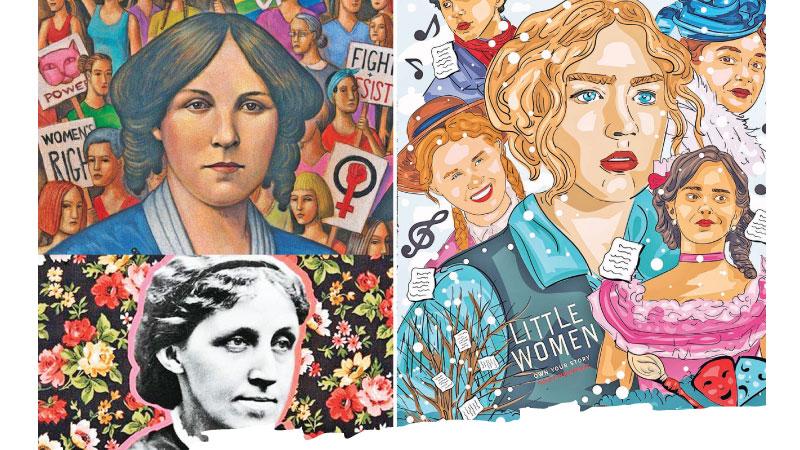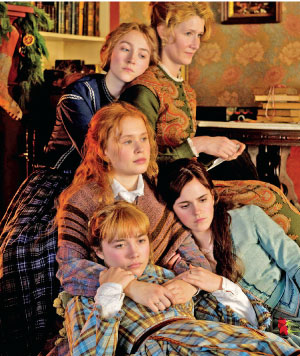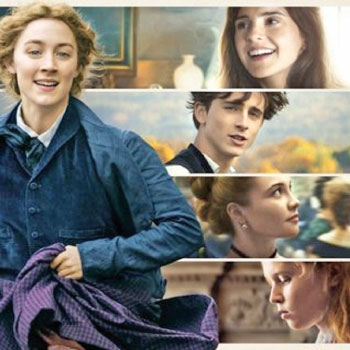
Jo getting her latest story published in a newspaper, Meg trying to not fall into the pleasure of getting a new dress, Amy in Paris with aunt March. and Beth at home playing her piano.
This is how the newly released movie version of Little Women begins.
A movie directed by Greta Gerwig, that runs over Louisa May Alcott’s two books Little Women and Good Wives (Little Women - Part Second).
Released on January 9, it has already become a great success, gaining many positive reviews. The NY Times defines it as a ‘Big Movie.’
A classic that is still contemporary. A story that is told by Jo, the second sister of the March family. Jo, played by Saoirse Ronan, is a young nonconformist heroine, independent, proud, with tomboyish manners, anger attacks and bad temper, throughout the story, she strives to dominate.
Jo is Alcott’s character. The entire book line is inspired by the real-life of the writer with her family and sisters at the house in Concord - Massachusetts.
Over the years Little Women’s book chain has been defined as a pedagogic storyline. A strange and counter current pedagogy which is the same taught by Louisa’s father, the transcendentalist philosopher Amos Bronson Alcott. He founded the Utopian Fruitlands an agriculture community. A family that lives with many other philosophers, colleagues of the man.
Louisa herself during the years did many jobs to economically support the Alcott family. Little Women is a door to enter the soul and ideologies of the writer; Louisa is a feminist ante litteram, abolitionist, supporter of female suffrage, single by choice and sworn enemy of the agreements that saw marriage the only chance of social ascension for women. And so, Louisa puts inside every female character of the story, a bit of herself and her ideologies. They are made to talk and act blowing them her soul. Every character in Little Women is a protest, is a denounce. Little Women was born as a novel ‘about girls, for girls.’
But, at that time, within days, among the thousand copies sold, there were also many male readers. It became a transversal book that went beyond genre, class and age. It wasn’t and it isn’t a book for children. It’s a great educational and pedagogic work. In fact, it describes childhood, teenagehood and adulthood with a freshness that crosses years and centuries.
The four girls are so unique that each of them can become our personal character. Jo (Saoirse Ronan) has the rebel soul and impetuosity, typical of this age. She tries to build her personality mixing the expectations of others on her and the expectations she has on herself.
In a conversation with Prof Baher he asks why, in the stories she publishes in the newspaper, she doesn’t sign in her real name. Jo answers that her mother doesn’t like her to write warlike and violent stories, but she wants to help her with the money that come from the publishing without worrying her.
On the other hand Meg (Emma Watson), being the eldest one, she’s projected into an adulthood surrounded by a family and a bourgeoisie that her family never had. Beth (Eliza Scanlen), the third March sister is the quietest one, she’s the innocence between childhood and teenagehood. She constantly expresses her love and her attachment to the family. In a scene she declares how she doesn’t want to play the piano to none other than her family. Amy (Florence Pugh) the last one has still the strength of childhood. She is blunt and plain-spoken and in constant conflict with the second sister, Jo.
Laurie (Timothée Chalamet), the neighbour and great friend of the family (lately he will marry Amy) is the typical teenager in constant conflict with the adult. He has several fights with his grandfather Mr. Lawrence (Chris Cooper).
The mother of the four sisters, Mary - in the movie called Marmee - (Laura Dern) is the example of the ideal figure during the teenagehood: she’s always there for her daughters, but she’s not invasive. And then aunt March (Maryl Streep, who - among the many movies she’s been in - plays the role of Emmeline Pankhurst in the movie Suffragette and the role of Clarissa Vaughan in The Hours - movie about Virginia Woolf’s life), an unmarried independent old lady, who despite her strong and determined temper, she doesn’t escape the influence of the society of the time. She’s obsessed with pushing each sister March to find a good, rich husband.
In a conversation with Jo, she insists on telling her to become a good woman in order to find a good man. Jo tells her that getting married isn’t among her plans and reminds her that she’s an unmarried woman. Aunt March responds to her with an iconic and funny phrase “I know, but I’m rich”. She’s the woman in the middle, the old woman grew up in a certain context, struggling to bring out her ideologies. Each character of the story seems to be a pedagogic, struggling figure.
The story goes on, they grow and enter adulthood. They have disappointments and satisfactions; life runs its course.
Like many great classics, which are not targeted for females or males, also this book chain is a jewel of effective education. It describes the friendship between Jo and Laurie, teaching the reader the gender equality. Those who say that today there aren’t gender issues are not saying the truth. Gender inequality has influenced our societies for centuries, dividing jobs, roles and the way of living. Women are the last stage of societies, the fact that in some of them these situations have been eclipsed by the frenetic city life, doesn’t mean that gender inequality doesn’t exist.
For example, we can see that in the researches of Anne Boyd Rioux, English professor at the University of New Orleans, she found out resistance in the schools over this book. Many teachers’ thought that Little Women (as many other books where there were female characters) would have been uninteresting for the boys. But, in the same list of books to propose to the class, there were those with males as main characters.
Little Women recalls a sisterhood that goes further than a family relationship. A sisterhood among women but also between women and men, that has to be strong in order to walk over gender inequality.
Despite the western setting of white feminism, a careful eye would see that, this kind of feminism is the one that asks independence. Independence from patriarchal societies, gender exclusion, stereotypes and diversification between male and female, a diversification that turns people away. It’s the kind of feminism that crosses borders, genders and cultures. It asks women to question and fix their role in this society, finding their emerging path. Are women only made to procreate, clean the house and fill the bellies of children and husbands?
Do we know that there’s a common, sometimes imperceptible belief that the male child is better than the female child? That for the male child is worth risking our own lives?
Can we see that the degree that a woman takes, is just a part of the CV to become a good wife?
It is a feminism that asks questions and doesn’t pretend to give answers.
Gerwig, director of Little Women, is also known for the 2017th movie Lady Bird; a movie about the teenagehood of Christine Lady Bird McPherson and the difficult relationship between the girl and her mother.
Gerwig made two movies that cross the complicated room of the teenage years and the life of girls during teenagehood. A black period which we all passed between rebellion and unjustified anger for everything surrounding us. Years of crazy ideas and in which friends become family and a group in which they find a safe place. She wants to underline how, still today, this life stage (as also the others) is different for girls.
“When I was a child I wanted to be Jo March, but now I want to be Louisa May Alcott” says Gerwig in an interview.
Jo gives in to the imposition of marriage because the societies of that tell writers that, if in the story there’s a woman; before the end, she has to marry or die.
But Louisa doesn’t get married. She lives the life as she feels it.
Despite that, Jo was Alcott’s heroine in ages when there weren’t many women as heroines. Jo became the untold symbol of a feminism that made its way through an era. Through Gerwig’s eyes we see Alcott, Jo, Laurie, Meg, Amy, Beth and all the other characters coming back to this world hand in hand, on a road of sisterhood; to tell us that we still need to be strong and united.
